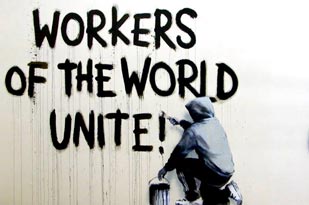| India and Pakistan – there can be solidarity |
 |
 |
| Monday, 20 June 2011 14:23 |
|
Like a breath of fresh air, this article will shed light on the common lived experience of the average Pakistani and Indian citizen. Like murky waters, the entrenched perception of division dominates India-Pakistan relations. The Samosa would like to shake up rooted conceptions of what it is to be Indian or Pakistani by recognising the workers’ struggle in both countries. In realising their similar fight we can call for greater solidarity.
Irrelevant of age, gender, culture or religion, workers throughout the two countries have been under-represented, under-valued and undermined in the workplace.
When speaking of the Indian and Pakistani workers’ struggle, we speak of a significant endeavour to survive. A decent pay and appropriate working conditions are the most logical means to a fulfilled, healthy life - not only for the worker but also for their families and thus their communities.
Birendra
Meet Birendra, a 43-year-old dalit worker from Uttar Pradesh who migrated to New Delhi at a young age in search of a job. He worked in a garment factory in Gurgaon, the major manufacturing hub of India that has attracted transnational corporations in search of cheap and fast labour.
After a few months of work without payment, Birendra filed a complaint for himself and his colleagues, which got him fired. His inspired supporters were also locked out of the factory. The explanation: sub-contracted factories are fearful to lose their production contracts with international companies if they can no longer offer the token of cheap labour.
It’s difficult to distinguish where the State’s priority lies as well, as if caught between strengthening the inflow of foreign investment for economic growth on the one hand and protecting citizen’s rights and needs on the other.
When Birendra tried to take the complaint to the Labour Court, the management filed false police reports claiming he had stolen goods from the factory. His rights were curtailed. The real price for standing up for his rights has been that he now works on a piece rate basis in a 10sqft room with three other tailors. Being part of the large informal sector in India means long hours and little pay, a total of 50 pounds a month for an average of 10-12 hrs work a day.
The international trade institutions of the IMF and World Bank have always highlighted the benefits that a growth in manufacturing could proffer in the name of economic development. An economic development that would supposedly translate to a rise in the standards of living.
Birendra hasn’t seen this rise in his standard of living. What he experiences is the diminishing of his purchasing power: soaring prices in basic goods and housing matched with frozen low wage levels simple does not provide.
He still gets threatening phone calls from the factory’s management. Despite this, he still finds the time to be a leader in human rights and mobilises workers to stand up and collaborate against injustice. He understands there is power in numbers.
Malika
Meet Malika, a 36-year-old mother that worked at a manufacturing plant for sportballs in Pakistan. When management changed the conditions of payment for women workers from a monthly basis to contract basis, Malika and three others contested the management’s decision arguing on the basis that this would not provide for their basic needs.
Malika and her colleagues’ contracts were terminated and whilst the Labour Court was able to reap recompensation for their unpaid work, they were still rendered jobless.
With a husband who has a chest condition, which sometimes makes it impossible for him to go to work, the family cannot financially sustain themselves. Without the 50 pounds a month salary, already insufficient in itself, their daughter might not be able to finish her education.
In the absence of state protection, one could suppose that international law would be of relevance. In fact, the rights of the worker are embedded in the International Labour Organization and also stipulated in both India and Pakistan’s Labour Laws.
Nonetheless, economic and social laws are not legally binding at the international level. At the national level, whilst owners of the manufacturing plants are experienced in curtailing domestic labour law and smart in satisfying simple compliance checks, workers have no way around it.
Here lies the relevance of solidarity.
The pressures that Indian and Pakistani workers face are too similar to ignore. Instead, this cultural intersection has the positive capacity to provide a basis for understanding.
It is about individually adopting this alternative representation of what it means to be Indian or Pakistani and letting it weave itself through in our businesses, civil societies and cultural engagement. If you run a successful charity in rural Pakistan, converse with organizations similar to you across the border. Perhaps you are concerned about migrant workers and their marginalization in the large city hubs; this is happening both in India and Pakistan. Maybe you are a student at a University abroad; why not create a society for solidarity? Together the chances of standing up against injustice are far greater.
Recognise that, aside from some politicians and businessmen that profiteer from inculcating further divisions, there is nothing to lose and instead with deeper solidarity there are only opportunities in the horizon.
If this resonates with you, speak up. Demonstrate that you welcome solidarity and want to progress from stereotypes . Let’s prove our strength in numbers. |
| Last Updated on Monday, 20 June 2011 15:08 |



 By Christina Rebel
By Christina Rebel 